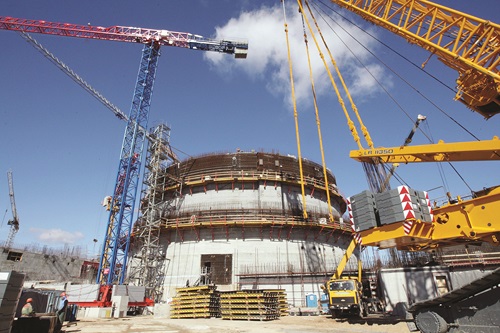Though the construction is progressing according to schedule and is well financed, Alexander Lukashenko urged them not to rush the work completion time at a meeting dedicated to issues of personnel training for the nuclear power industry. This is a case where haste could harm; everything should be done qualitatively and carefully. Effective use of advanced scientific technologies and the safe and reliable functioning of nuclear industry sites will primarily depend on its workers specialist knowledge and training.

At the Belarusian nuclear power station construction site. Photo BelTA
The importance of nuclear industry development isn’t in doubt. Today, around 200 nuclear power stations are being exploited in more than 30 countries in the world. The USA, France and Japan boast the greatest capacities while fast-growing China, India and South Korea promote the latest technologies at a quickened pace. The future station in Ostrovets should cover almost a third of the country’s needs in electrical energy. The energy of the atom is much cheaper than that received from hydrocarbons. Undoubtedly, this is beneficial for business, for the population and for the economy as a whole. Moreover, the nuclear power station will enable us to replace almost 5bn cubic metres of natural gas — a solid saving for the state budget.
The station is being built in partnership with Russia and experts are unanimous in their opinion that this will be the most contemporary site of ‘3+’ generation with the highest degree of protection. The construction of stations in Finland, Hungary and Vietnam using the blueprint for the Belarusian nuclear power station is under discussion. “We’re building the world’s best nuclear power station. Russia, together with us, wants to show what nuclear power stations should be in the future,” noted the President.
The new nuclear power station will become a growth point for us and we must consider carefully who will be working there. The foundations have been laid and Belarus’ Education Minister, Mikhail Zhuravkov, reported to the President about the implementation of the 2008-2020 state programme of staff training for the nuclear power industry. At present, over 500 people have already finished their studies and around 800 students are currently studying in four universities in six specialities. This year, an educational and training complex is to appear in Ostrovets. The Minister made the conclusion: the interest of alumni towards training in specialities connected with nuclear power industry is rising, as are the requirements for them.
“The total number of entrants has increased 1.5-2-fold for some specialities. Would-be nuclear power specialists are paid enhanced studentships and the most promising students take internships in training centres in Russia, Switzerland, France and Finland, so the knowledge received by the students is extremely high,” he added.
Staff with higher qualifications, at the level of postgraduate training programmes and master courses, have unfortunately still to be prepared in foreign universities. Mr. Lukashenko suggested leaning toward the Russian capabilities and long-term agreements with Russian leading universities have already been concluded. Of course, this isn’t cheap but we need to start with something, since only specialists boasting practical experience of work are allowed to work with nuclear reactors. During the initial stage, the most complex technical works at the Belarusian nuclear power station will be performed by Russian specialists. However, in the course of time, they will be replaced with Belarusian staff, so investments into the preparation of our own scientific base will pay for themselves in the future.
To prepare highly professional specialists is only half the battle. It’s important to create proper conditions, enabling them to work successfully. This issue was also discussed at the session. Three new micro-districts are being built in Ostrovets and the Energy Minister, Vladimir Potupchik, presented the figures, “By 2017, we need to commission 340,000sq.m of housing in Ostrovets. 108,000sq.m have been already constructed, enabling us to solve the issue of the placement of specialists for the nuclear power industry who are employed in the construction of the station.” As far as provision of accommodation is concerned, Mr. Lukashenko called on officials to act cautiously. There mustn’t be a wholesale giveaway of housing; rather the approach should be differentiated and the best conditions should be offered to high-class specialists. Generally, all nuclear power specialists will have decent salaries and the housing issue won’t be an obstacle. At the same time, the social infrastructure is also being developed, with new schools, kindergartens and trade sites being constructed soon. All these will make the town more comfortable for living in.
By Vladimir Khromov











